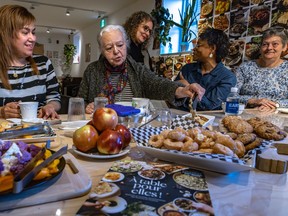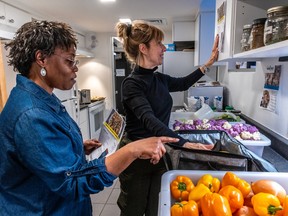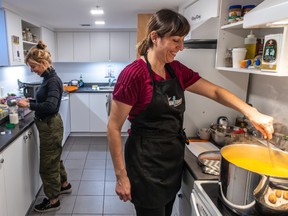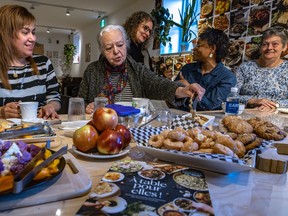As they drop by to pick up their food kits, residents sheltering at Maison Ste-Marie sit and chat — and the ripple effect is “a sense of belonging.”

Article content
At the height of the coronavirus pandemic, the 2021 annual report of Le Chaînon, a venerable Montreal organization which has been helping women in difficulty for nearly a century, said that residents of one of its buildings were hungry.
Women come to Le Chaînon in crisis, often with no income or even identification. Many are victims of intimate partner violence or have mental or physical health problems or substance abuse issues. The role of the organization is to keep them safe and support them in taking back their lives.
Advertisement 2
Article content
At Maison Esplanade, the main Le Chaînon shelter and where they stay when arriving, the women are served three meals a day. As they become more autonomous, they move to longer-term transitional housing in Maison Ste-Marie, which has 49 furnished units or rooms with individual kitchens and where residents are responsible for preparing their own meals.
But during the pandemic, food banks and other resources they relied on to address their food insecurity closed or drastically slashed services and Le Chaînon food services co-ordinator Odette Montigny was concerned that the women of Maison Ste-Marie were hungry. She, Le Chaînon executive director Sonia Côté and head chef Sophie Senécal brainstormed in search of a solution.
“We thought about it,” Côté recalled, “and asked: ‘Why not a box?’”
Inspired by the offerings of such meal-kit companies as HelloFresh and GoodFood, they came up with prototypes of carriers and Senécal developed simple, affordable recipes that relied on ingredients on hand in the Le Chaînon kitchen.
The program, named Les Marmitonnes, was “popular immediately,” said Côté, and it has continued.
Advertisement 3
Article content
“The women really appreciated it — and we realized it was an essential need,” said Senécal, program manager for Les Marmitonnes.
Every Thursday, the women of Maison Ste-Marie receive, at no charge, a zippered container holding a meal kit featuring pre-portioned ingredients for two to three servings of a meal and a printed recipe featuring detailed instructions. Recycled pill bottles hold required amounts of spices.

“The goal is to interest the women in cooking,” said Le Chaînon chef Senécal, who is responsible for recipe development and culinary content for Les Marmitonnes. (The word marmiton is French for kitchen assistant.) “I’m available if they have questions — to give them advice or help them to cook a recipe.”
Said Maison Ste-Marie resident Guylaine Gaulin: “I find it makes me want to cook. Otherwise, I eat sandwiches. Here I learn to eat well — and it helps me to cook.”
Now 48 recipes from chef Senécal have been collected in a book, À table pour elles! Histoire et recettes réconfortantes des femmes du Chaînon (Éditions Québec Amérique). Written by Isabelle Hébert, Annick Desmarais and Senécal, the illustrated French-language volume includes a history of Le Chaînon, which last year helped 1,600 women and served 9,000 meals, and profiles and photos of current and former residents.
Article content
Advertisement 4
Article content
The recipes, suitable for beginning cooks, include hearty soups and spaghetti sauce, shepherd’s pie, Mexican-style stuffed peppers and leek and ham crumble. On a recent Thursday, the Marmitonnes meal kit contained fixings for a vegetarian cauliflower gratin topped with chopped almonds and an apple and a granola bar for dessert.
If Senécal concentrated on recipes, Les Marmitonnes co-ordinator Nicole Mongrain was initially responsible for talking to the women about the program and recruiting them as participants.
“To befriend the women, we had to proceed slowly,” she recalled. “We started by delivering the boxes to them.”
In time Mongrain, who had volunteered at Le Chaînon since 2017 and was hired in early 2022 as Les Marmitonnes co-ordinator, started to ask women to come down to the Maison Ste-Marie common room, with its adjacent kitchen, to pick up the boxes instead of delivering them — “and the effect was communication, exchange.”
The main goal of Les Marmitonnes is to provide food security — but the program also addresses the isolation faced by many residents. For them, the program has “broadened their networks and helped to give them a better quality of life,” said Le Chaînon director Côté. Senécal and Mongrain “give soul” to Les Marmitonnes, she said.
Advertisement 5
Article content
As they come by on Thursdays to pick up their boxes, the women sit for a spell around a table set with such snacks as cheese and crackers, veggies with dip and cookies right out of the oven, enjoy a mug of coffee or a bowl of soup, and chat and network: One woman might offer to help another to fill out a form, for instance, take another to a medical appointment or assist a resident studying toward her high school leaving exams with homework.
“We saw it had a bigger impact than we would have imagined,” said Côté.

A weekly program in which the woman gather to cook together in a collective kitchen environment is set to start up again early next year.
Women can stay at Maison Ste-Marie for up to five years as they work with Le Chaînon counsellors on regaining their self-confidence and developing their potential: Some attend school during this time; others have jobs. The counsellors are “the heart of our organization,” said Côté. “They listen and they help our women.”
For resident Laila Derfouf, who has worked as a designer, “Le Chaînon is my family.
“I felt when I came here as if I was in my mother’s arms,” she said.
Advertisement 6
Article content
Mongrain’s responsibilities include doing an inventory of available ingredients for Marmitonnes recipes, assembling the meal kits and going over the instructions with the women when they pick them up. But there’s more to what she does.
With the myriad issues and challenges they have faced, even those who knew their way around a kitchen had somehow lost the taste for cooking, she said. “They had grown tired of life: My role is to encourage them. I want them all to feel important.
“Some share stories and anecdotes,” she said. “We try to recreate a family ambience here and the women come to feel a sense of belonging to Les Marmitonnes: It is like a big family. I am interested in their lives and what they want to tell me.”
“I understand that things are difficult for them. I bring no judgment — and they sometimes tell me things in confidence.”
Mongrain said she respects their confidentiality — unless she thinks there is a danger for the women, in which case she encourages them to speak to their counsellors.
She said she learns from the residents. Some have worked in fields including design and accounting “and they teach us things,” she said.
Advertisement 7
Article content
“Some have had captivating lives,” said Côté. “Then dramatic situations happen and they lose their footing.”
Seeing the women every Thursday “is a way of knowing how they are doing,” she said.
And if they don’t come down for the kits, “we reach out to them to see if they are OK.”
In addition to its emergency shelter and Maison Ste-Marie, Le Chaînon has a residence for older women with 15 permanent studio apartments. A fourth building, set to open in autumn 2025, will feature 27 subsidized apartments for women alone or with children.
Established in 1932 on Fairmount Ave. by a woman named Yvonne Maisonneuve to help women in need, Le Chaînon has grown to have a budget of $9 million as well as a foundation: proceeds from sales of À table pour elles will go to the foundation.
Le Chaînon also has two stores on St-Laurent Blvd., one on the Plateau and one in Villeray, which carry gently used items, from furniture to housewares; proceeds help to underwrite the organization’s operating budget.
For the women of Le Chaînon, homelessness is not necessarily a chronic problem but, rather, a circumstantial or situational one, said director Côté. And when the women do move into their own apartments, Le Chaînon helps to furnish them and fills their fridges.
“What is important when people leave homelessness is to have that safety net around them to prevent them from becoming homeless again,” she said.
Recommended from Editorial
Advertisement 8
Article content
Article content




Comments